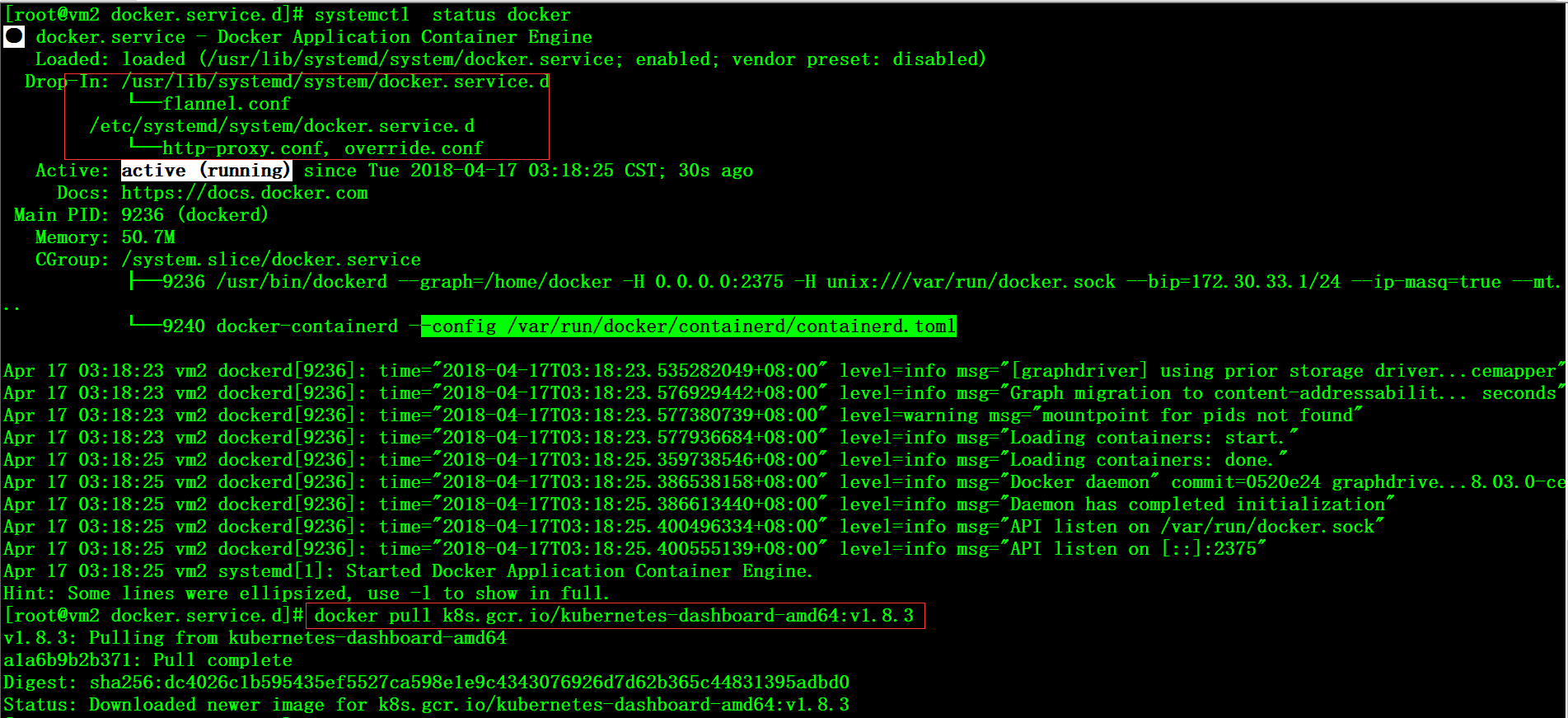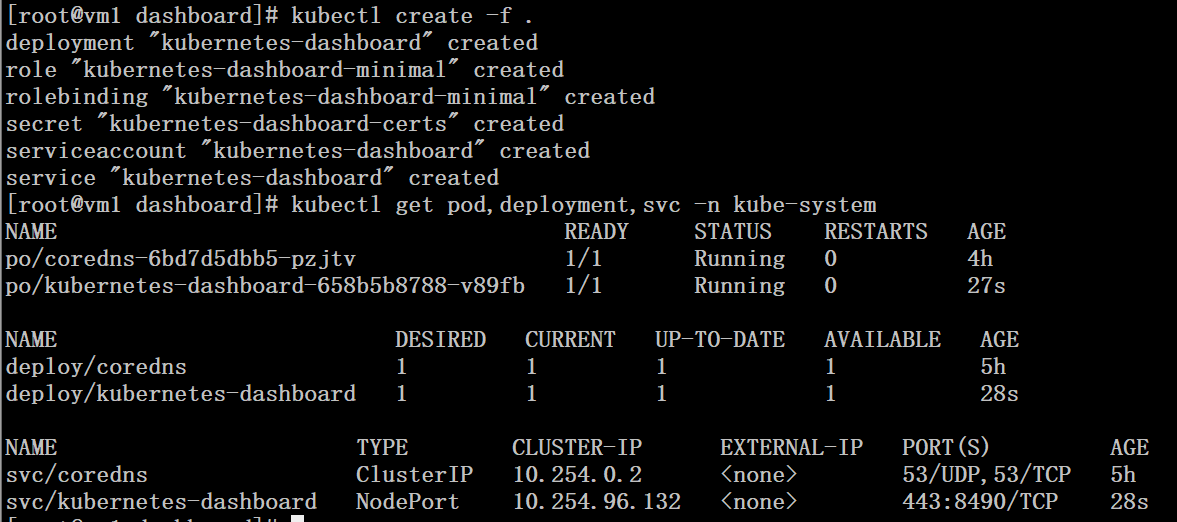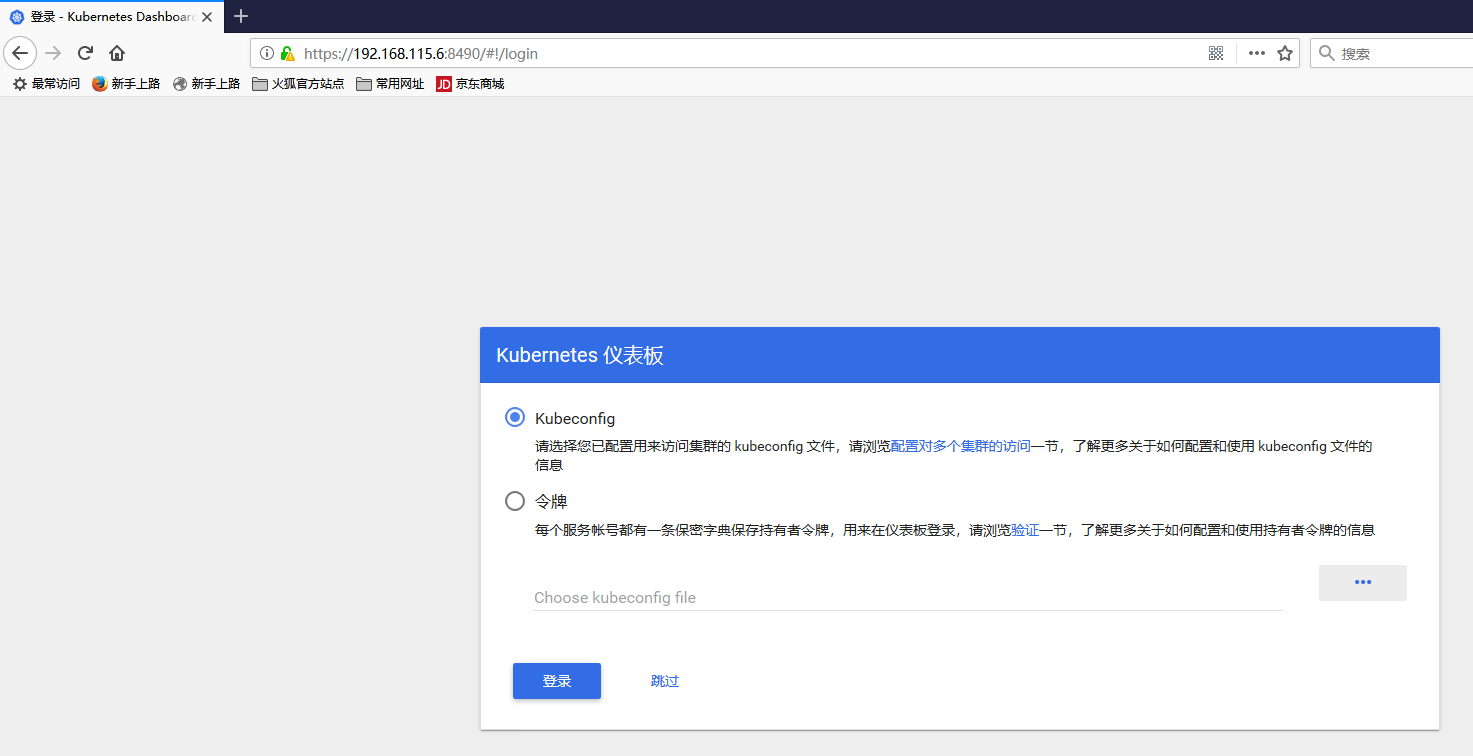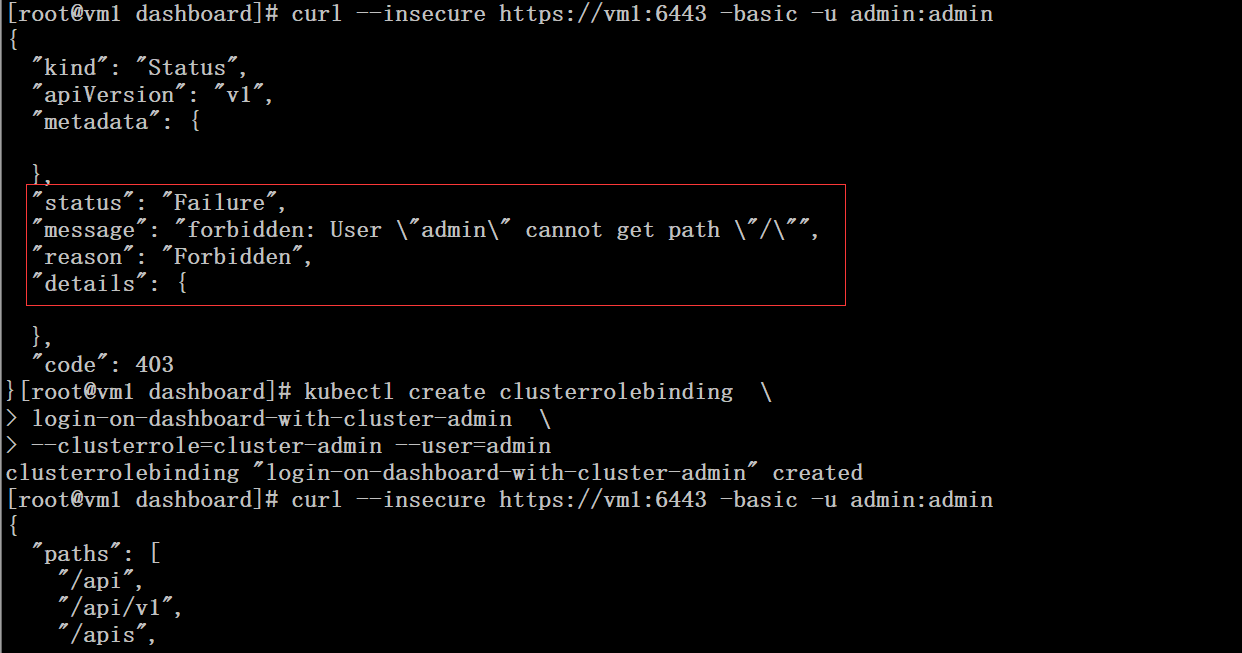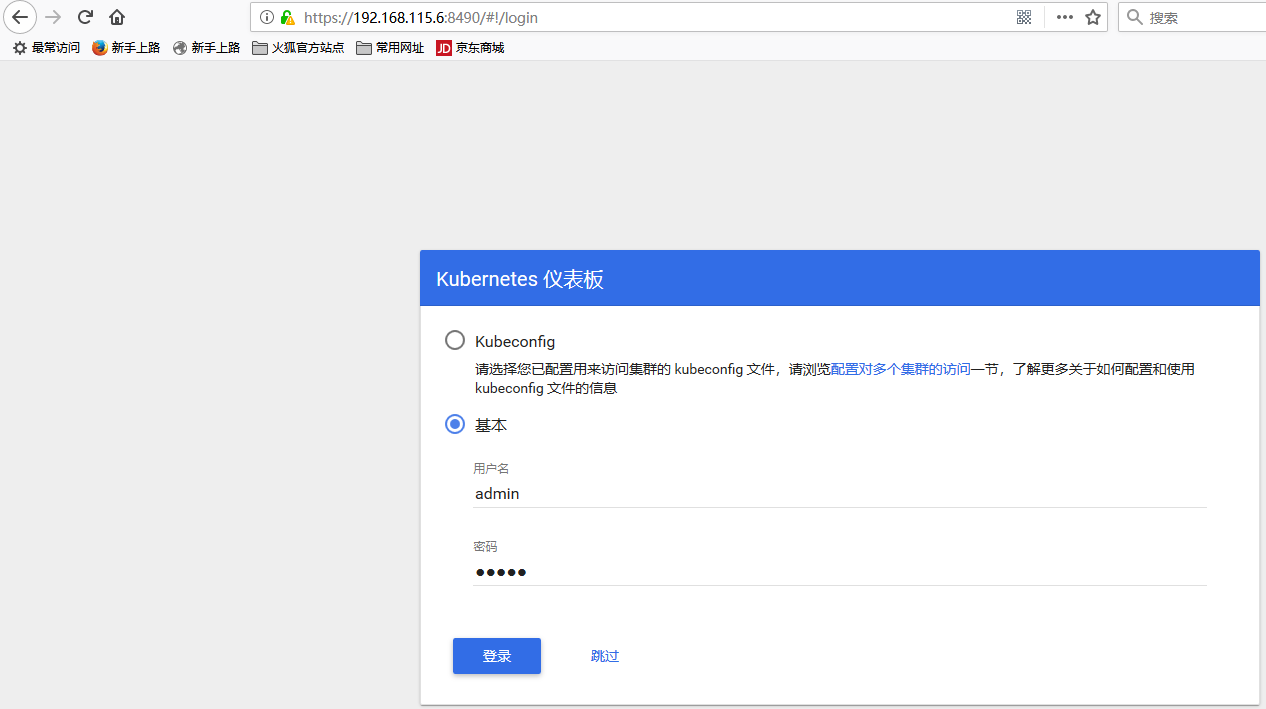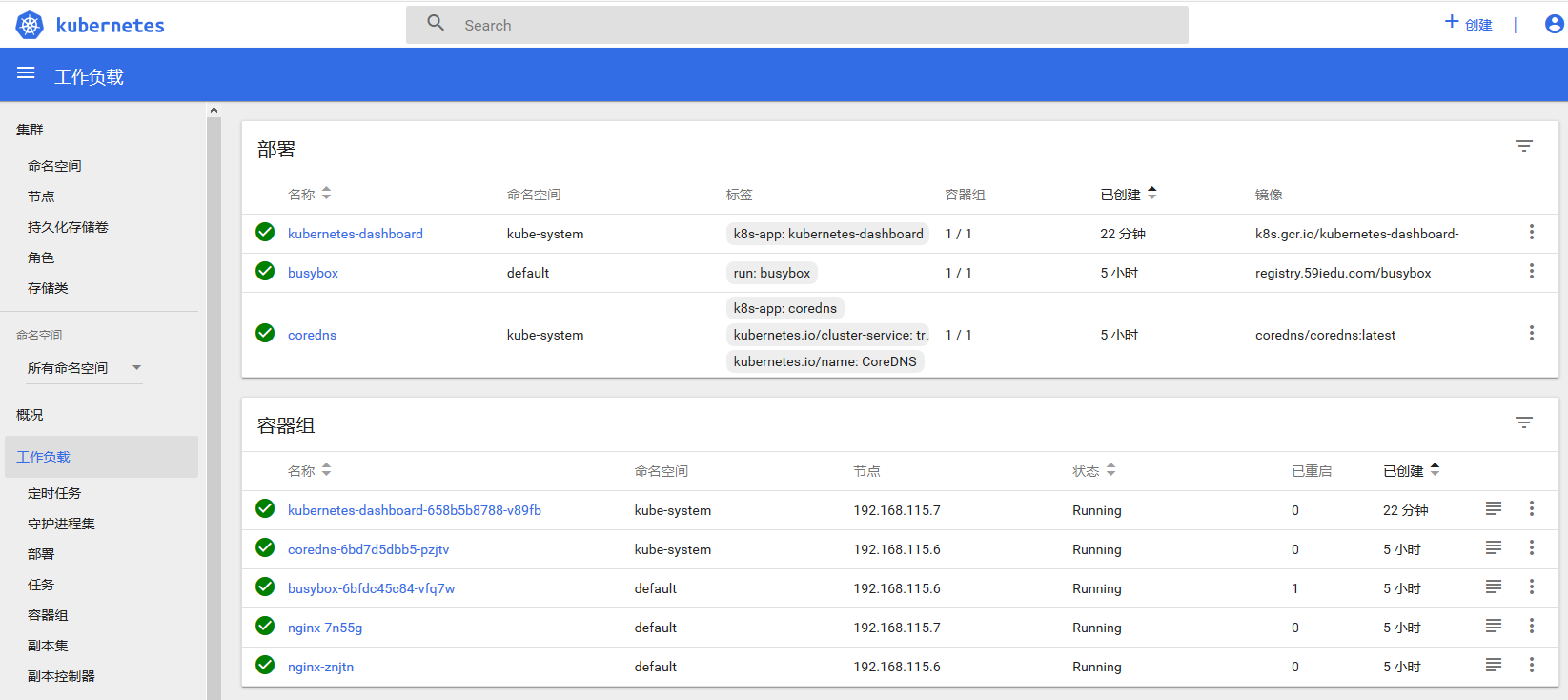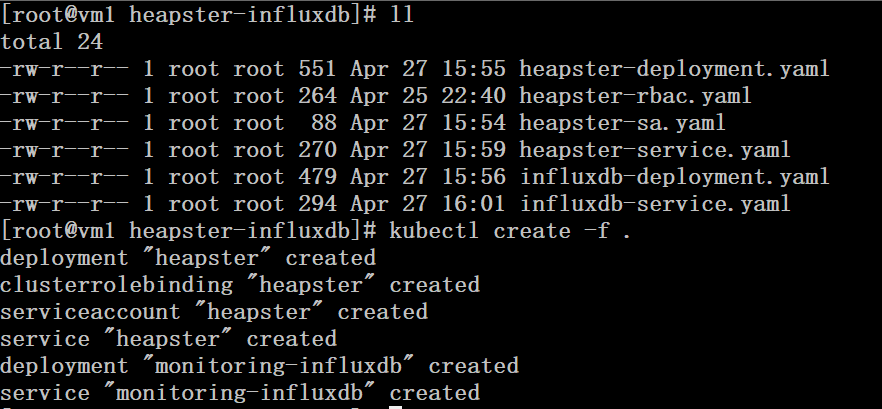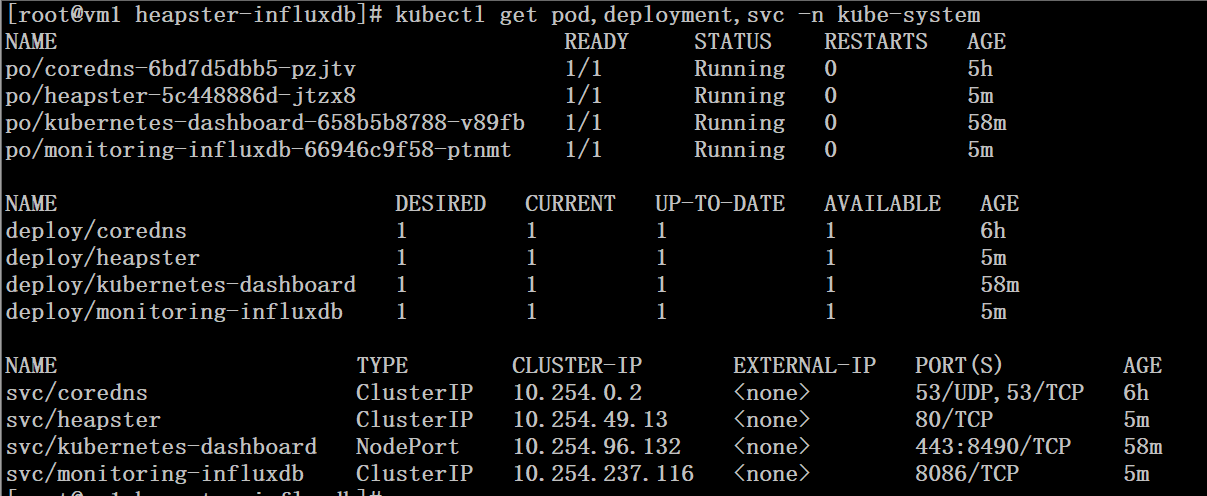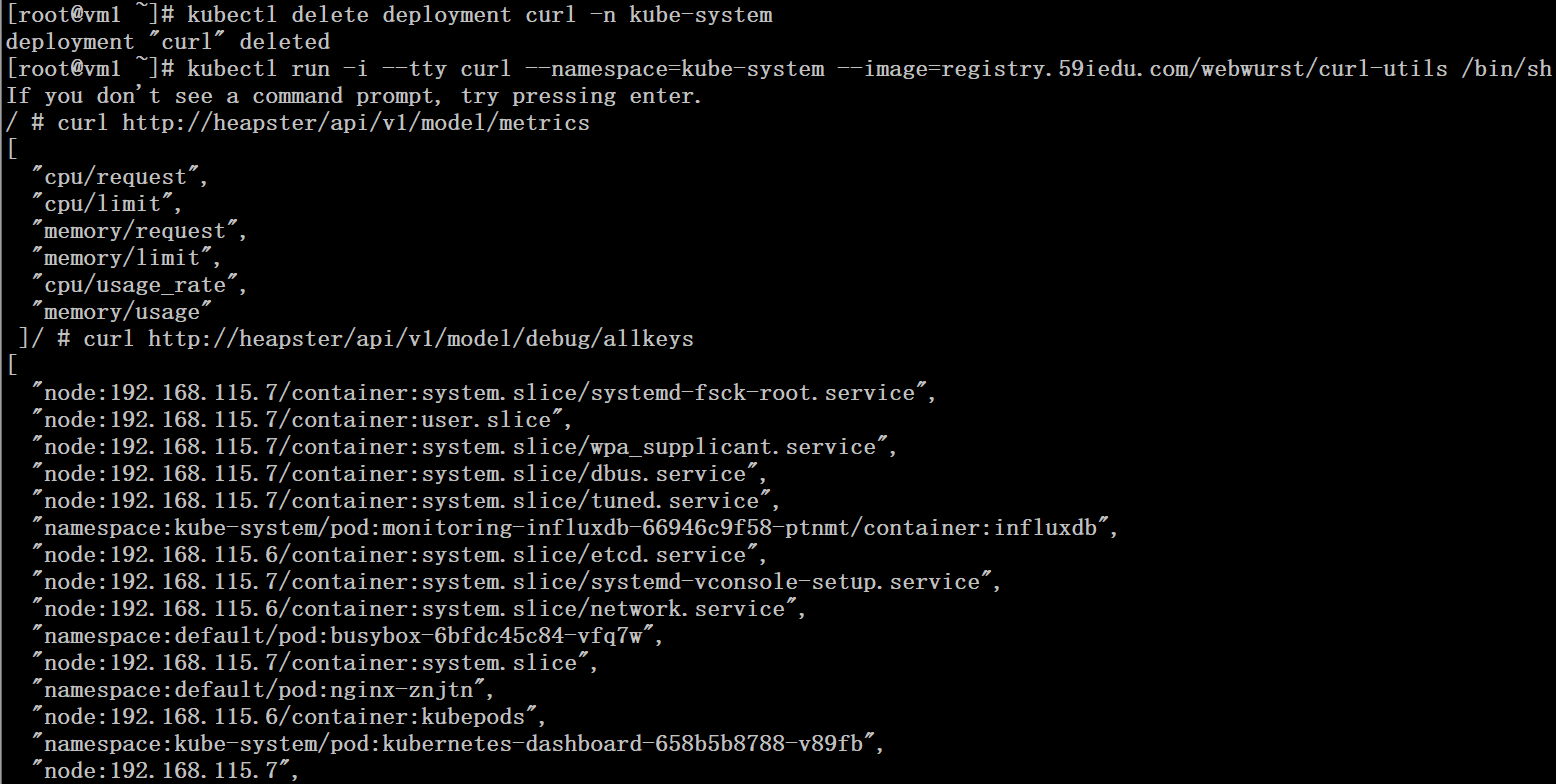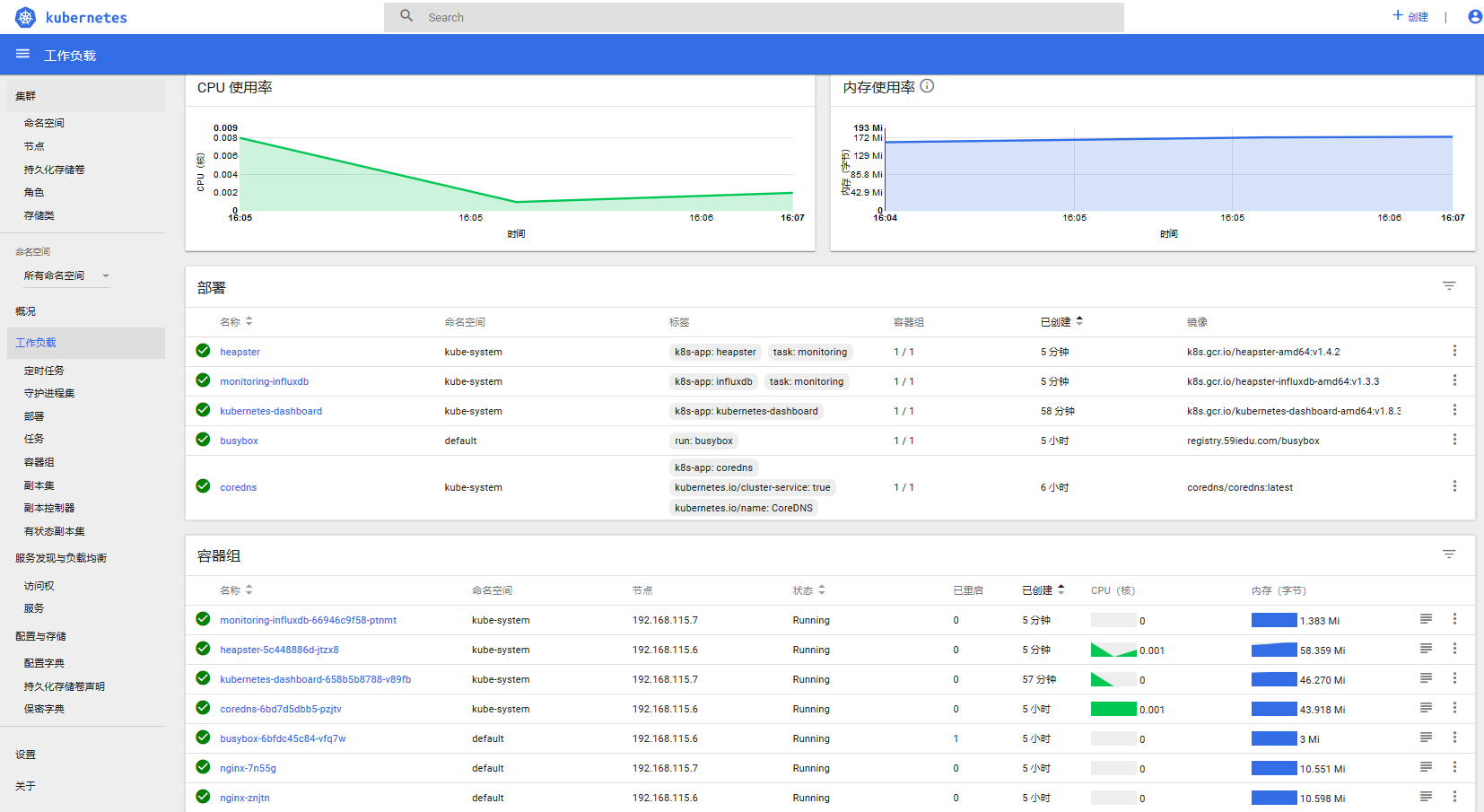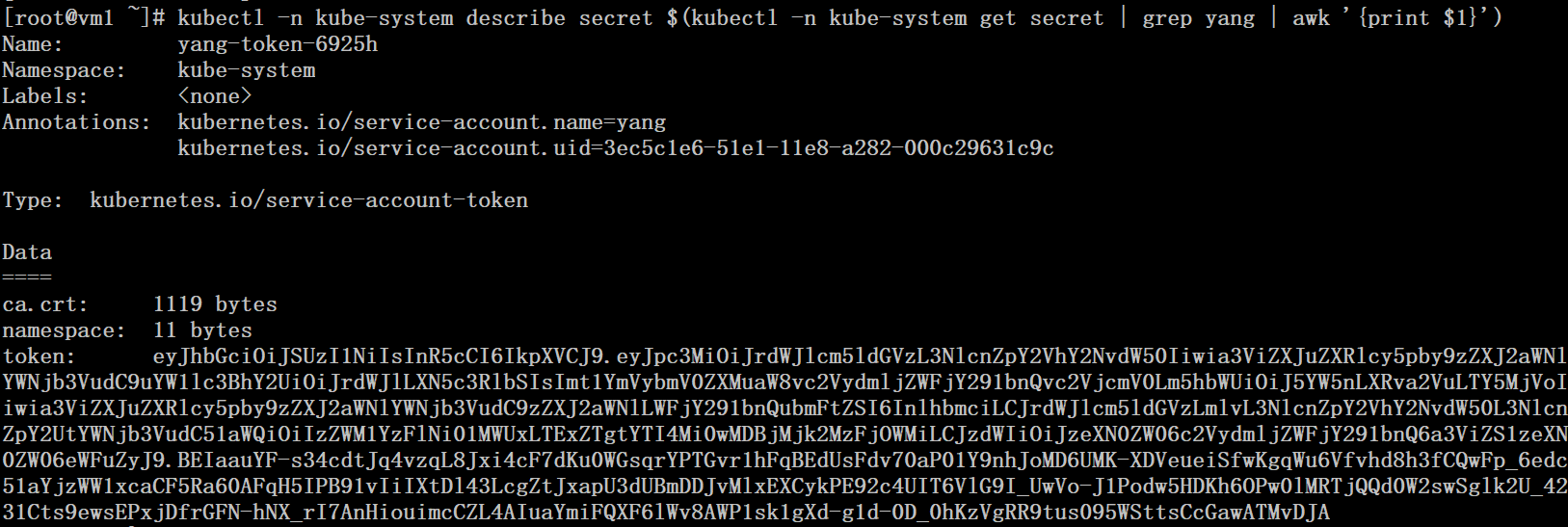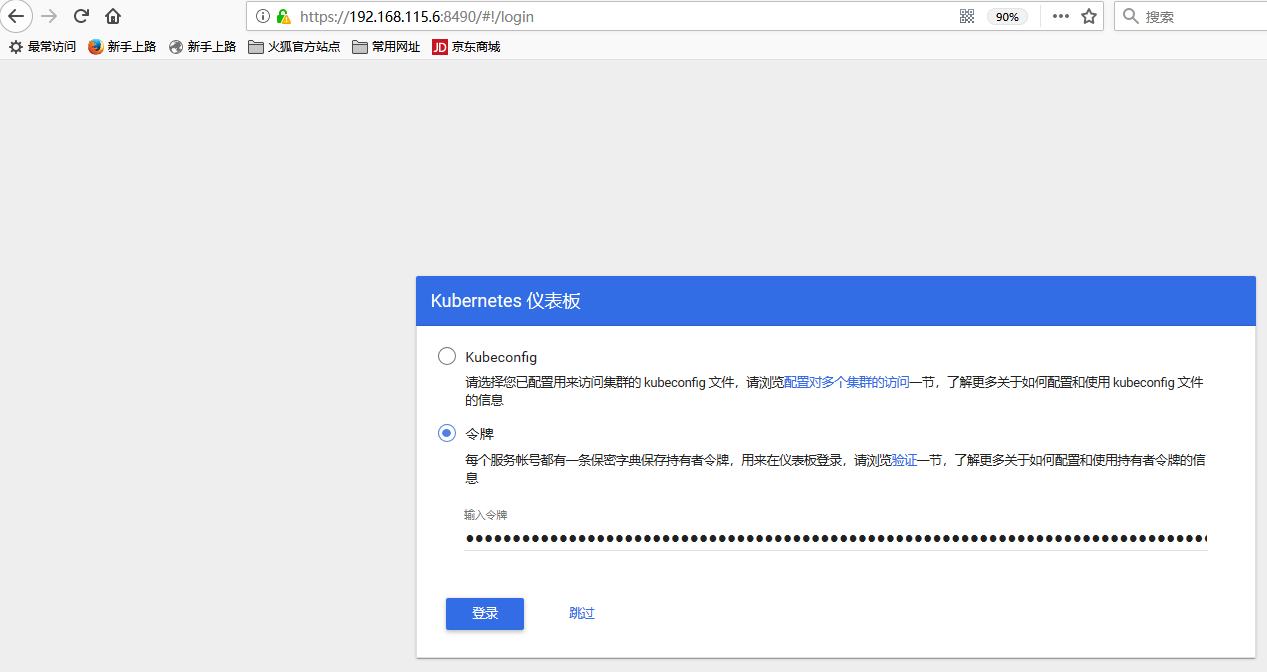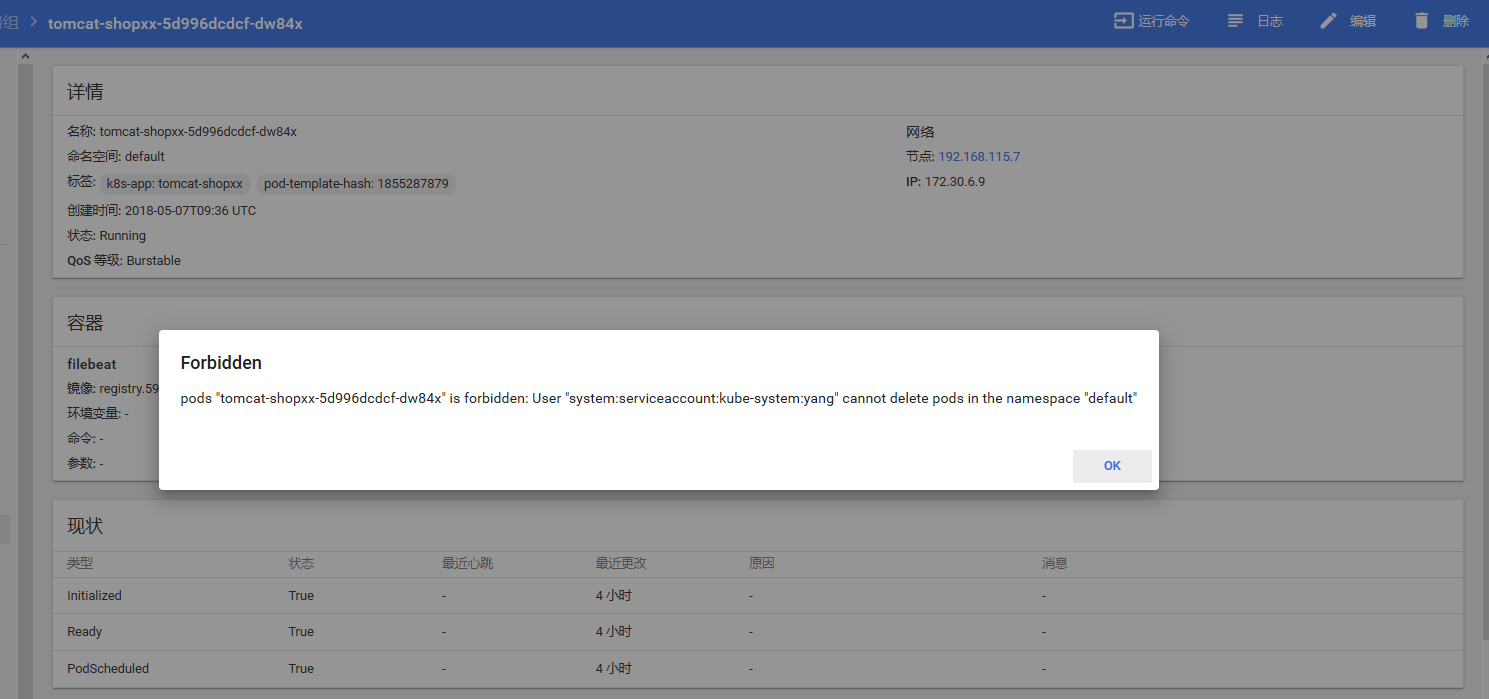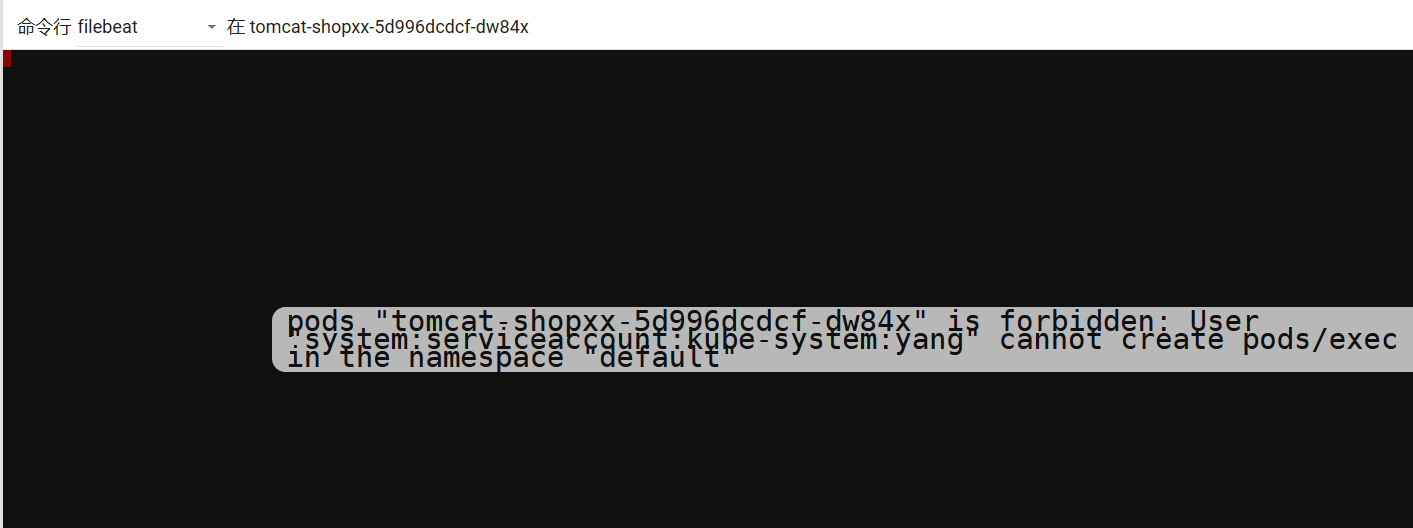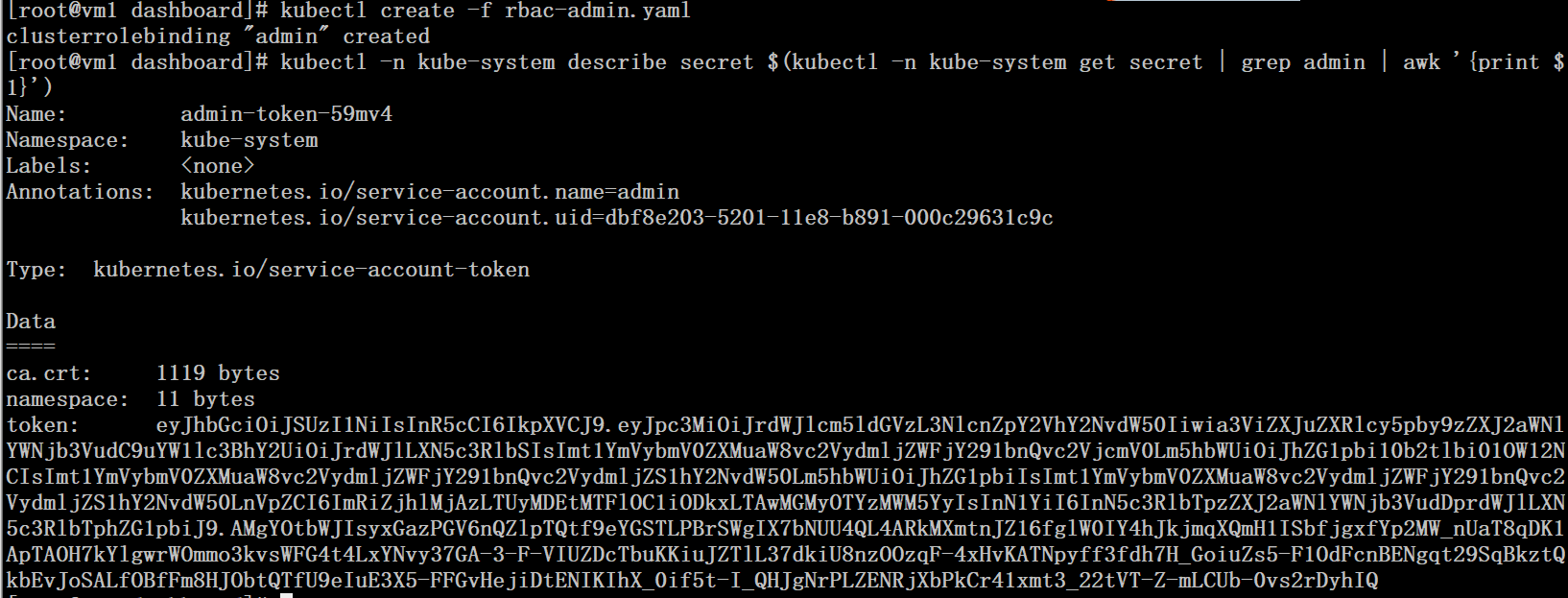轉載:http://blog.51cto.com/ylw6006/2113542
K8S使用dashboard管理集羣
今年3月份在公司的內部k8s培訓會上,開發同事表示使用dashboard的可以滿足日常開發需求,例如查看pod的日誌,執行exec指令,查看pod的運行狀態等,但對basic認證的權限控制表示擔憂。
之前介紹過在1.5.2版本上部署dashboard服務,在1.9.1版本離線部署中,也介紹過dashboard服務的RBAC配置和使用技巧。因此本文將在前文基礎上完善Heapster的整合與利用token對用戶權限進行控制。
dashboard的特點主要如下:
1、能夠直觀的看到rc、deployment、pod、services等k8s組件的運行情況和日誌信息。
2、結合heapster和influxdb後,dashboard的監控圖表上可以看到pod的cpu和內存消耗情況。
Heapster介紹
1、Heapster是容器集羣監控和性能分析工具,支持Kubernetes和CoreOS。
2、K8S集羣的HPA功能的實現就依賴於這些metric數據,HPA將Heapster作爲Resource Metrics API,向其獲取metric。
3、Kubernetes有個cAdvisor監控(在1.9版本里面,cAdvisor已經和kubelet整合在一起)。
在每個kubernetes Node上都會運行cAdvisor,它會收集本機以及容器的監控數據(cpu,memory,filesystem,network,uptime)。Heapster是一個收集者,Heapster可以收集Node節點上的cAdvisor數據,將每個Node上的cAdvisor的數據進行彙總,還可以按照kubernetes的資源類型來集合資源,比如Pod、Namespace,可以分別獲取它們的CPU、內存、網絡和磁盤的metric。默認的metric數據聚合時間間隔是1分鐘。還可以把數據導入到第三方工具(如InfluxDB)。
Influxdb數據庫介紹
2、Influxdb數據庫的相關知識介紹,可參考文檔:https://www.jianshu.com/p/d2935e99006e
2、如果對Heapster收集到的metric數據沒有持久化的需求,可以不配置Influxdb數據庫
3、本文Influxdb數據庫的存儲採用emptydir的方式實現,實際使用過程中,可以選擇吧Influxdb數據庫部署在k8s集羣外部,或者使用其他存儲方案。
4、如果有需要的話,還可以集成一個grafana做web展示。Grafana配置可參考文檔:http://blog.51cto.com/ylw6006/2084403
一、獲取相關鏡像
需要科學上網方式獲取到dashboard相關的鏡像文件,倉庫可納入本地倉庫統一管理
# cat /etc/systemd/system/docker.service.d/http-proxy.conf [Service] Environment="HTTP_PROXY=http://192.168.115.2:1080"# systemctl daemon-reload# systemctl restart docker# docker pull k8s.gcr.io/kubernetes-dashboard-amd64:v1.8.3# docker pull k8s.gcr.io/heapster-influxdb-amd64:v1.3.3# docker pull k8s.gcr.io/heapster-amd64:v1.4.2
二、準備配置文件
1、k8s-dashborad-sa.yaml文件,secrct和serviceaccount配置
# cat k8s-dashborad-sa.yaml # ------------------- Dashboard Secret ------------------- #apiVersion: v1kind: Secretmetadata: labels: k8s-app: kubernetes-dashboard name: kubernetes-dashboard-certs namespace: kube-systemtype: Opaque---# ------------------- Dashboard Service Account ------------------- #apiVersion: v1kind: ServiceAccountmetadata: labels: k8s-app: kubernetes-dashboard name: kubernetes-dashboard namespace: kube-system
2、k8s-dashborad-rbac.yaml文件,配置 Role和Role Binding
# cat k8s-dashborad-rbac.yaml # ------------------- Dashboard Role & Role Binding ------------------- #kind: RoleapiVersion: rbac.authorization.k8s.io/v1metadata: name: kubernetes-dashboard-minimal namespace: kube-systemrules: # Allow Dashboard to create 'kubernetes-dashboard-key-holder' secret.- apiGroups: [""] resources: ["secrets"] verbs: ["create"] # Allow Dashboard to create 'kubernetes-dashboard-settings' config map.- apiGroups: [""] resources: ["configmaps"] verbs: ["create"] # Allow Dashboard to get, update and delete Dashboard exclusive secrets.- apiGroups: [""] resources: ["secrets"] resourceNames: ["kubernetes-dashboard-key-holder", "kubernetes-dashboard-certs"] verbs: ["get", "update", "delete"] # Allow Dashboard to get and update 'kubernetes-dashboard-settings' config map.- apiGroups: [""] resources: ["configmaps"] resourceNames: ["kubernetes-dashboard-settings"] verbs: ["get", "update"] # Allow Dashboard to get metrics from heapster.- apiGroups: [""] resources: ["services"] resourceNames: ["heapster"] verbs: ["proxy"] - apiGroups: [""] resources: ["services/proxy"] resourceNames: ["heapster", "http:heapster:", "https:heapster:"] verbs: ["get"] ---apiVersion: rbac.authorization.k8s.io/v1kind: RoleBindingmetadata: name: kubernetes-dashboard-minimal namespace: kube-systemroleRef: apiGroup: rbac.authorization.k8s.io kind: Role name: kubernetes-dashboard-minimalsubjects:- kind: ServiceAccount name: kubernetes-dashboard namespace: kube-system
3、k8s-dashborad-deployment.yaml配置文件,定義創建pod的模板和副本數
# cat k8s-dashborad-deployment.yaml # ------------------- Dashboard Deployment ------------------- #kind: DeploymentapiVersion: apps/v1beta2metadata:
labels:
k8s-app: kubernetes-dashboard
name: kubernetes-dashboard
namespace: kube-systemspec:
replicas: 1
revisionHistoryLimit: 10
selector:
matchLabels:
k8s-app: kubernetes-dashboard
template:
metadata:
labels:
k8s-app: kubernetes-dashboard
spec:
containers:
- name: kubernetes-dashboard
image: k8s.gcr.io/kubernetes-dashboard-amd64:v1.8.3
ports:
- containerPort: 8443
protocol: TCP
args:
- --auto-generate-certificates # Uncomment the following line to manually specify Kubernetes API server Host
# If not specified, Dashboard will attempt to auto discover the API server and connect
# to it. Uncomment only if the default does not work.
# - --apiserver-host=http://my-address:port
volumeMounts:
- name: kubernetes-dashboard-certs
mountPath: /certs # Create on-disk volume to store exec logs
- mountPath: /tmp
name: tmp-volume
livenessProbe:
httpGet:
scheme: HTTPS
path: /
port: 8443
initialDelaySeconds: 30
timeoutSeconds: 30
volumes:
- name: kubernetes-dashboard-certs
secret:
secretName: kubernetes-dashboard-certs
- name: tmp-volume
emptyDir: {}
serviceAccountName: kubernetes-dashboard # Comment the following tolerations if Dashboard must not be deployed on master
tolerations:
- key: node-role.kubernetes.io/master
effect: NoSchedule4、 k8s-dashborad-service.yaml配置文件,定義service
# cat k8s-dashborad-service.yaml # ------------------- Dashboard Service ------------------- #kind: ServiceapiVersion: v1metadata: labels: k8s-app: kubernetes-dashboard name: kubernetes-dashboard namespace: kube-systemspec: ports: - port: 443 targetPort: 8443 nodePort: 8490 type: NodePort selector: k8s-app: kubernetes-dashboard
三、通過配置文件創建dashboard
# kubectl create -f .# kubectl get pod,deployment,svc -n kube-system
四、配置使用basic認證方式
默認情況下只支持kubeconfig和令牌認證
# echo 'admin,admin,1' > /etc/kubernetes/basic_auth_file # grep 'auth' /usr/lib/systemd/system/kube-apiserver.service --authorization-mode=Node,RBAC \ --runtime-config=rbac.authorization.k8s.io/v1alpha1 \ --enable-bootstrap-token-auth=true \ --token-auth-file=/etc/kubernetes/token.csv \ --basic-auth-file=/etc/kubernetes/basic_auth_file \# grep ‘basic’ k8s-dashborad-deployment.yaml (配置在args下面) - --authentication-mode=basic# systemctl daemon-reload# systemctl restart kube-apiserver # kubectl apply -f k8s-dashborad-deployment.yaml
將admin用戶和cluter-admin role進行角色綁定
# curl --insecure https://vm1:6443 -basic -u admin:admin # kubectl create clusterrolebinding \login-on-dashboard-with-cluster-admin \ --clusterrole=cluster-admin --user=admin# curl --insecure https://vm1:6443 -basic -u admin:admin
五、訪問測試
六、整合heapster和influxdb
在沒有配置heapster和influxdb的情況下,pod的metric信息是無法獲取到的,而早前版本K8S的HPA特性依賴的metric數據來源恰巧就是heapster和influxdb。
1、準備yaml配置文件
# cat heapster-sa.yaml apiVersion: v1kind: ServiceAccountmetadata: name: heapster namespace: kube-system
# cat heapster-rbac.yaml kind: ClusterRoleBindingapiVersion: rbac.authorization.k8s.io/v1beta1metadata: name: heapsterroleRef: apiGroup: rbac.authorization.k8s.io kind: ClusterRole name: system:heapstersubjects:- kind: ServiceAccount name: heapster namespace: kube-system
# cat heapster-deployment.yaml apiVersion: extensions/v1beta1 kind: Deployment metadata: name: heapster namespace: kube-system spec: replicas: 1 template: metadata: labels: task: monitoring k8s-app: heapster spec: serviceAccountName: heapster containers: - name: heapster image: k8s.gcr.io/heapster-amd64:v1.4.2 imagePullPolicy: IfNotPresent command: - /heapster - --source=kubernetes:https://kubernetes.default - --sink=influxdb:http://monitoring-influxdb.kube-system.svc:8086
# cat heapster-service.yaml apiVersion: v1kind: Servicemetadata: labels: task: monitoring kubernetes.io/cluster-service: 'true' kubernetes.io/name: Heapster name: heapster namespace: kube-systemspec: ports: - port: 80 targetPort: 8082 selector:k8s-app: heapster
# cat influxdb-deployment.yaml apiVersion: extensions/v1beta1kind: Deploymentmetadata:
name: monitoring-influxdb
namespace: kube-systemspec:
replicas: 1
template:
metadata:
labels:
task: monitoring
k8s-app: influxdb
spec:
containers:
- name: influxdb
image: k8s.gcr.io/heapster-influxdb-amd64:v1.3.3
volumeMounts:
- mountPath: /data
name: influxdb-storage
volumes:
- name: influxdb-storage
emptyDir: {}# cat influxdb-service.yaml apiVersion: v1kind: Servicemetadata: labels: task: monitoring kubernetes.io/cluster-service: 'true' kubernetes.io/name: monitoring-influxdb name: monitoring-influxdb namespace: kube-systemspec: ports: - port: 8086 targetPort: 8086 selector: k8s-app: influxdb
獲取heapster中的獲取支持的metrics
# kubectl run -i --tty curl --namespace=kube-system \--image=registry.59iedu.com/webwurst/curl-utils /bin/sh # curl http://heapster/api/v1/model/metrics# curl http://heapster/api/v1/model/debug/allkeys
# kubectl get node # kubectl top node
當heapster和influxdb pod都正常運行的時候,在dashboard裏面就可以看到CPU和內存的監控數據了。
七、配置用戶權限
1、刪除apiserver裏面basic認證相關的配置後重啓apiserver
--basic-auth-file=/etc/kubernetes/basic_auth_file
# systemctl daemon-reload# systemctl restart kube-apiserver
2、刪除clusterrolebinding
# kubectl delete clusterrolebinding login-on-dashboard-with-cluster-admin
3、修改k8s-dashborad-deployment.yaml文件
去掉- --authentication-mode=basic參數
4、創建普通用戶,賦予所有namespace下資源的get、watch和list權限。
這裏通過clusterrole和culsterrolebinding賦予所有namespace相關資源的get、watch、list權限,實際應用環境建議使用創建role和rolebinding指定特定的namespace相關資源權限,各資源權限的賦予規則遵循最小權限原則。
# cat rbac-yang.yaml kind: ClusterRoleapiVersion: rbac.authorization.k8s.io/v1metadata: name: role-yangrules:- apiGroups: [""] resources: ["*"] verbs: ["get","watch","list" ] - apiGroups: ["storage.k8s.io"] resources: ["*"] verbs: ["get","watch","list" ] - apiGroups: ["rbac.authorization.k8s.io"] resources: ["*"] verbs: ["get","watch","list" ] - apiGroups: ["batch"] resources: ["*"] verbs: ["get","watch","list" ] - apiGroups: ["apps"] resources: ["*"] verbs: ["get","watch","list" ] - apiGroups: ["extensions"] resources: ["*"] verbs: ["get","watch","list" ] ---kind: ClusterRoleBindingapiVersion: rbac.authorization.k8s.io/v1metadata: name: role-bind-yangsubjects:- kind: ServiceAccount name: yang namespace: kube-systemroleRef: kind: ClusterRole name: role-yang apiGroup: rbac.authorization.k8s.io
# kubectl create sa yang -n kube-system# kubectl create -f rbac-yang.yaml # kubectl -n kube-system describe secret $(kubectl -n kube-system get secret | grep yang | awk '{print $1}')5、測試普通用戶的權限
6、創建super用戶admin
# kubectl create sa admin -n kube-system# cat rbac-admin.yaml apiVersion: rbac.authorization.k8s.io/v1beta1
kind: ClusterRoleBinding
metadata:
name: admin
roleRef:
apiGroup: rbac.authorization.k8s.io
kind: ClusterRole
name: cluster-admin
subjects:
- kind: ServiceAccount
name: admin
namespace: kube-system# kubectl create -f rbac-admin.yaml # kubectl -n kube-system describe secret $(kubectl -n kube-system get secret | grep admin | awk '{print $1}')
使用admin用戶的token登陸後繼承cluster-admin的權限
參考:
https://github.com/kubernetes/dashboard/wiki/Creating-sample-user
https://github.com/kubernetes/dashboard/wiki/Access-control
https://github.com/kubernetes/heapster/blob/master/docs/model.md
版權聲明:原創作品,如需轉載,請註明出處。否則將追究法律責任
轉載:http://blog.51cto.com/ylw6006/2113542

